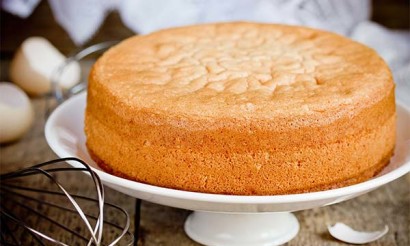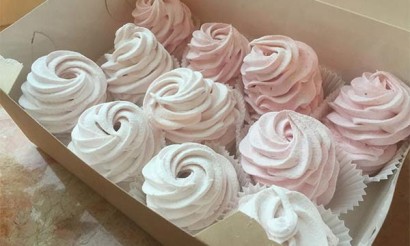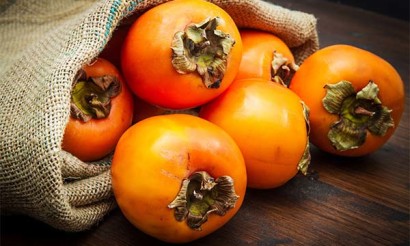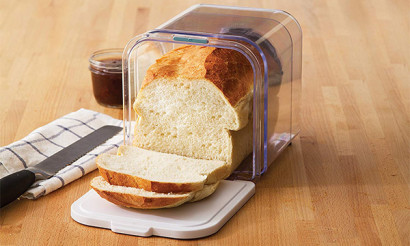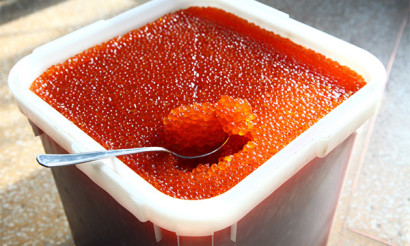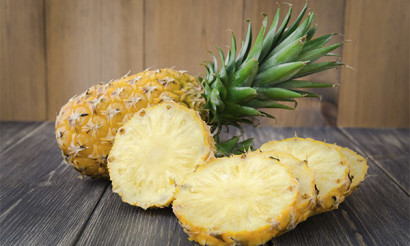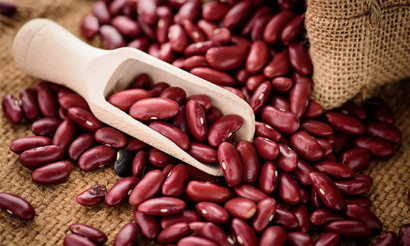How to store coffee at home
- Why Coffee Spoils
- Storing Green Beans
- Storing Roasted Beans
- Storing Ground Coffee
- How to Preserve Instant Coffee
- Coffee Capsules
- How to Preserve Pre-Made Coffee
- Can I Store Coffee in the Fridge
- General rules of storage
- How to know that you are dealing with a quality product
- Features of Storing Different Sorts of Coffee
- How expired coffee affects your health
- Interesting Facts about Coffee
A truly subtle bouquet of aromatic beverage can be felt only when coffee is made from fresh beans. This requires proper brewing and, no less importantly, careful storage so that the beans do not lose their unique aroma. Sophisticated coffee connoisseurs know how difficult it is to preserve the true noble taste, avoiding any bitterness or acidity, so we gathered a memo to all lovers of the golden beverage on how to keep coffee fresh at home.
Why Coffee Spoils
It is known that coffee beans are rich in vitamin and mineral complex of raw materials, which also contain antioxidants and essential oils. Under the influence of external factors these compounds decompose quickly, due to which the aromatic beans lose their unique flavor-aromatic qualities.
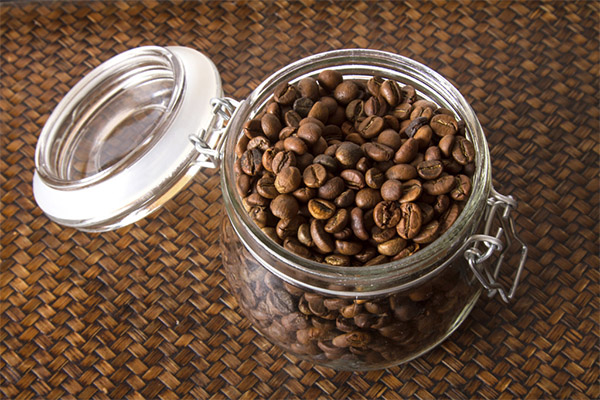
Freshly ground coffee beans are harmed by:
- Sunlight and direct light;
- Moisture in the air;
- oxygen;
- Temperature changes;
- Foreign odors.
Fresh roasted coffee releases vapor and carbon dioxide when exposed to changing temperatures or heat, causing condensation. In the open air and light the coffee powder oxidizes and loses its useful properties. Besides this the organoleptic quality is disturbed: coffee may become tasteless, with unpleasant bitterness, acidity, dusty or metallic taste.
Another distinctive property of coffee is its hygroscopicity. Many people may have heard that the appetizing smell kills other aromas, so it is often offered in perfume stores as a "filter" for other odors. Coffee, especially ground into a powder, should not be placed near strongly smelling products, if the raw material is still going to be brewed - it will absorb foreign impurities, due to which the drink will turn out unpalatable.
In order for dried coffee to retain its subtle rich aroma, it must be stored properly in accordance with the specifics of raw materials.
Storing green beans
Fresh coffee beans, which have not yet been roasted, must be protected from moisture, so that the product does not become moldy and fermented. It is permissible to store in a freezer. Such grains need a constant temperature, so it is desirable to store them in a well-ventilated room to eliminate the possibility of condensation and other unpleasant consequences.
Heat treatment is allowed to avoid spoilage of the product. For this purpose the beans are dried at a low temperature of not more than 40 ° C in a slightly open oven. But such treatment of the product requires experience so as not to spoil the entire batch - the desired condition is very subtle. To experiment, you may start with a small batch of grains and repeat the procedure only if the experience is successful.
Such grains are stored for no more than a couple of months.
Storing Roasted Beans
A classic roasted coffee, which you can buy in specialized stores, order on the Internet or bring from faraway countries, is a product prepared by the producer for consumption. As a rule, coffee is so expensive that no manufacturer would dare to poorly pack the product: almost every modern pack is equipped with a special valve for "breathing" the beans.
Roasted beans release carbon dioxide for some time after processing and normally retain a certain degree of humidity. For this purpose, they use one-way baffles, which allow the gas to leave the package, but prevent pernicious oxygen from penetrating into it. Thanks to such valves, it is possible to taste the aroma of the coffee even before you buy it.
Keeping coffee in a zip-top bag is the best option. At the same time it is necessary to let excess air out of the bag. When it comes to a large stockpile, it is better to have a desk jar and every week or two refresh the handy stock without touching the total mass of fragrant coffee every day.
Storing in beans is the best option for extending the shelf life of the product. Being corked in its own, crusted beans, coffee stays fresh and pleasant to the taste longer, while the ground product is exhausted. Therefore it is advisable to grind coffee once a week - for the nearest reserve, or even better - before every brew. Although other experts say that it is still necessary to let the coffee be opened and not to brew it immediately after grinding.
Thus, it is best to store coffee in a foil bag - with or without a valve - at a neutral temperature - not over the stove and not in the refrigerator. You can use a glass or ceramic jar with a tightly closing top, but avoid plastic bags.
The shelf life of an open package is about 2-4 months, closed - up to 6-8 months.
Storing Ground Coffee
If you have to buy ground coffee out of practicality, you can store it for no more than 2 months in a tightly closed zip-top "native" (not plastic!) bag or jar. It is desirable to choose in this case opaque containers or keep the jar away from daylight.
Do not put the coffee in the fridge, the temperature changes can have a negative impact on the organoleptic properties of the product (the taste and aroma of the finished drink).
How to store instant coffee
Soluble product, unlike its "organic" counterparts, is less sensitive to temperature changes, and can be stored for up to 2 years in a tightly closed and moisture-proof jar. Such coffee, as we know, is already deprived of all useful properties, it has no vitamins, antioxidants and other valuable elements for the body. Sodium and caffeine remain in the drink, so it remains an invigorating, blood pressure booster and diuretic.
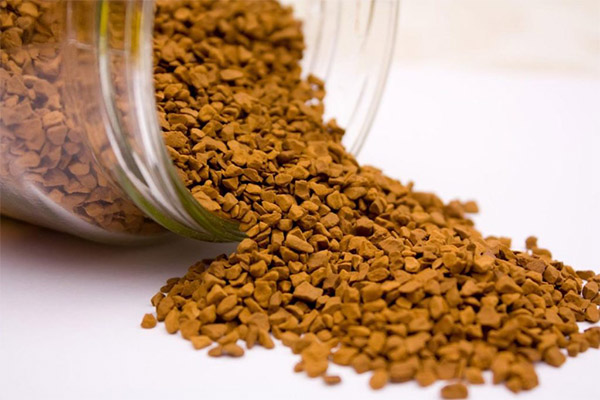
There is no need to put the powder (be it granules, lumps or powder) in the refrigerator, just protect it from moisture. Weathered and foreign impurities directly affect the flavor of the drink, this is an extra reason to keep the jar closed.
As for coffee drink based on chicory and other herbal ingredients, they often need to reduce the shelf life, so as not to lose their flavor and not to spoil.
Storing Coffee in Capsules
Convenient invention for coffee machines allows you to store the product for up to 1 year outside the refrigerator - the packaging is airtight and protected from moisture. The main rules remain protection from the sun and heat, avoiding overcooling of raw materials, preservation of packaging. Containers should not be opened until they are used in the machine, so that the coffee does not dry out or get damp.
How to store a ready portion of coffee
Some drinks are known to be many times more delicious if they are allowed to infuse, so sometimes the finished coffee is left for a few hours. What you need to know about this type of coffee storage:
- A serving should not stand for more than a day, otherwise the organic beverage can turn from healthy to unhealthy for the body. Coffee that stands longer, even in the refrigerator, is better to pour out.
- Store brewed coffee better without sugar, otherwise in the heat the drink can quickly ferment. The same applies to the milk mixture.
- The ready drink can be stored at room temperature or in the refrigerator door for several hours. Sometimes make coffee ice, such a product should also be consumed within a day, maximum - two.
Among other things, it is necessary to keep clean coffee utensils and tools, washing off the grounds - especially sweet - turks, cups, French-press and parts of coffee machines. Third-party contamination or the breeding of microorganisms on dishes can significantly impair the taste of the beverage and ruin expensive raw materials.
Can you keep coffee in the refrigerator?
Coffee experts warn that coffee should not be kept in the refrigerator. Many consumers may reason that refrigeration will extend the shelf life of the product and help keep it fresh. But that's not entirely fair; the harm of keeping coffee in the refrigerator can outweigh the benefits.
Constant temperature fluctuations sometimes cause natural condensation to form in the package, which can not only seriously spoil the taste, but also lead to mold growth in the raw material. In addition, the open product can absorb extraneous odors.
At the same time, in order to save a large supply of coffee, it can be frozen. There are a few rules which must be followed:
- In the freezer coffee is stored in a hermetically sealed bag, preferably not opened at all.
- Do not re-thaw and freeze raw materials. For convenience, a large stock can be pre-divided into portions, such as weekly, and take them one at a time, without removing the total mass.
- It is desirable to let all the air out of the package before sending it to freeze, otherwise the oxidation processes can spoil the product.
It should be understood that freezing can improve or degrade the taste of different types of coffee. In addition, this type of storage can extend the shelf life of the product for only a few months.
General rules for storage
Based on the characteristics of coffee products, the raw material needs these storage conditions:
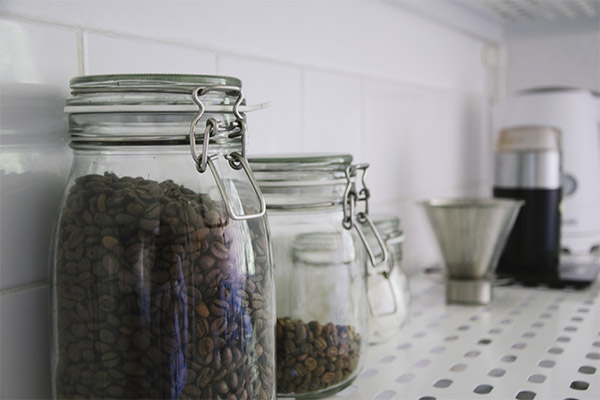
- A closed sealed package, ideally - with a zipper fastener and a valve to remove carbon dioxide. If there is no foil package nearby, you can use a ceramic or glass jar - frosted, with a tightly closing lid. It is better not to store coffee products in plastic containers or bags, because this material easily absorbs odors and can give the drink itself a synthetic taste.
- Stable room temperature. Coffee should not be placed over heaters or stoves, sent to the refrigerator, or kept near sources of humidity.
- Stored whole (if possible). Toasted beans lose their great aroma more slowly than grinded beans.
- After each use, the coffee should be tightly covered and hidden. If we are talking about a month's supply, experts recommend dividing it into several portions by weeks, so that the total mass is not exhausted due to the daily opening of the packet.
- More often than not, coffee beans or ground coffee are sold in special thermo packs with a valve for air. This is the most reliable modern way to keep your drink enjoyable for a long time.
The shelf life of freshly harvested coffee beans, contrary to popular belief, is only a few months, and for ground coffee even less. Use up purchased raw materials should be a couple of weeks, if the product is already ground, and the packet is opened. In an airtight package before it is damaged, the beans or powder can be stored for up to six months, but not for several years.
How to know that you are dealing with a quality product
Modern coffee producers take great care of their products, prolonging their freshness. Among the innovations were developed packaging with multifunctional valve: it allows you to feel the aroma of coffee blend before you open the pack, but most importantly - it does not let the beans or powder to get damp. The valve works in one direction, so the raw material does not oxidize or transpire in the air.
Previously, foil bags with an airtight clasp as well as ordinary envelopes were used for packaging coffee. Good coffee is not sold in thick paper. Sometimes you can find coffee in glass or tin cans - inside the product is also bagged. It is not recommended to keep coffee in metal.
To buy a good packet, you need to pay attention to its appearance:
- It should not be too bloated.
- The product inside should be homogeneous, if we are talking about ground coffee - slightly soft, like wet sand, not too loose, but in no case solid.
- A good manufacturer indicates quality marks on the outer package - international certificates, distinctions and composition of the product (mandatory). The secret of the blend is rarely disclosed, but on the package should write the origin (country and region) of the beans, as well as the type of coffee - Arabica or Robusta, perhaps their percentage ratio in the mixture.
- The best quality is undoubtedly the coffee, packaged in the places where it grows. Nevertheless, coffee preparation has now become a deeply professional industry, which is why many European producers have an impeccable approach to their work.
Special features for preserving various types and grades of coffee
After gathering coffee is subjected to fermentation and drying in the sun on site, this is considered the primary processing. Next, the beans are usually sent to coffee producers around the world for wholesale distribution. At this link, fresh coffee beans are carefully and quickly transported and then subjected to additional processing - roasting and sometimes grinding and sublimation to make an instant beverage.
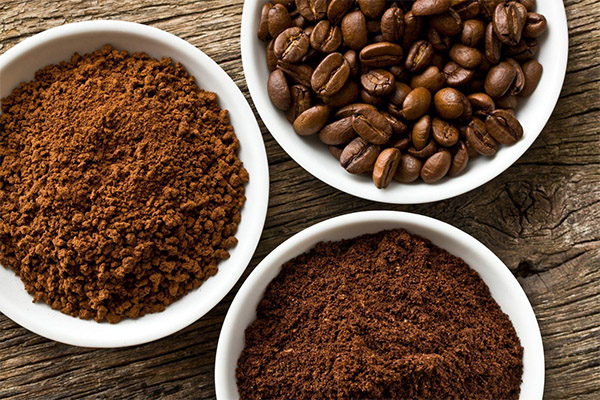
Experts-tasters work on unique delicious combinations, offering consumers not only first-class coffee varieties from all over the world, but also their pleasant taste combinations, which are called blends. One blend can combine coffees of different grades and roasts.
Storage life is also affected by factors such as blend, degree of roasting, maturity, and freshness of the beans. Some varieties are harvested green, lightly dried and almost never roasted before sale. This is characteristic of Arabica from Ethiopia and some other varieties. Such coffee will be full of vitamins, antioxidants and tannins. It should not be stored for a long time, otherwise the aroma might disappear and you would get a "toxic" bitterness in the bouquet. The aroma might also change beyond recognition, with, for example, the smell of marsh grass and a hint of chocolate becoming "dusty" rather than that of flowers and fruit.
Coffees with a stronger roast roast roast last longer, but any extreme is detrimental. Coffee which is roasted for a long time acquires a "dusty", burnt aroma or simply loses it.
Robustas are prone to develop a bitter taste if they are stored too long.
The optimal option is medium roast and neutral blends of Arabica and Robusta. The peculiarity of such blends is the combination of very different types of coffee. Sometimes this is a plus: while some notes "die off" in the bouquet during long-term storage, other notes remain. On the other hand, mixed blends can "fall apart" due to this effect, changing their flavor beyond recognition.
All this just once again proves that you should not stock up on this valuable product for a long time, it is better to periodically buy fresh ingredients. If we are talking about buying a rare collectible coffee - do not store it "for the holiday", enjoy the exquisite taste until it sinks into oblivion.
Effects of expired coffee on human health
If coffee has overstayed, first of all it loses its flavor-aromatic properties and acquires some earthy, rancid unpleasant aroma. At the same time, experts say that the beans themselves have no harmful effects on the body. The only unpleasant symptoms may be heartburn or mild diarrhea.
Dangerous can be coffee that has been stored incorrectly, especially when it comes to ground beverage or green beans. If there was condensation in the packaging or third-party moisture has accumulated in the product - there is a high probability of bacteria and fungi breeding, such coffee is best thrown away without regret.
If the product was uncovered, it can collect dust and harmful impurities, especially if the wet coffee was stored in a metal container.
The same applies to brewed coffee that has been sitting for several hours-it can have time to ferment, even if no sweetener was added to the cup, due to the natural acids and sugars in the product.
If the coffee has an unpleasant taste, it is worth thinking about what might have caused it: the utensil, the method of preparation or improper storage. In the latter case, the raw material must be recycled or disposed of.
That's interesting: Expired coffee does not have to be thrown away. Whole, beautiful beans can be used for decorative purposes, for photos, and as an external sorbent.
Interesting facts about coffee

- There are several specific varieties of coffee that are processed by passing naturally through the body of animals. The caustic gastric juice of the animals eats away at the shell of the fruit, draining it of all its bitterness, so that the varieties acquire a noble chocolate, nutty and other mild notes of taste and aroma.
- In addition, for some time now scientists have been breeding unique coffees without bitterness or undesirable aromatic impurities. These varieties are grown under specially created conditions - in a finely tuned climatic environment, taking into account the humidity of the air, the composition of the soil and the purity of the atmosphere.
- The best coffees are those grown in ecologically clean areas away from settlements. The cleaner the climate and soil of the region, the more subtle and refined the taste. It may have fruity, floral, nutty notes and sometimes citrus and other ethereal impurities. It is known that the overall composition of coffee is constant, but individual varieties may have elevated levels of iron, potassium, and other minerals. This not only affects the taste of the drink, but also makes it more or less valuable to the body.
- As of today, cocoa trees are rapidly disappearing from the world. Scientists are worried that coffee will suffer the same fate. The closest species to it, the breadfruit, and the drink made from its fruit, carob, are considered substitutes for the product.
- Thanks to advertising, the recent boom in green coffee beans has introduced the idea that this kind of coffee is much healthier for the body. It is said to have lower caffeine content and more antioxidants. This is partially true. But at the same time green coffee has more tannins and complex compounds, which can be allergic to the body. Often thermally unprocessed plant proteins provoke rejection in the human body, so green coffee should be enjoyed in moderation.
The aroma of coffee is one of the most beloved smells on the planet, and getting a bag of gourmet beans is something every coffee drinker aspires to do. To truly enjoy the prized beverage, store it carefully and pay attention to the most interesting ways to brew it.
«Important: All information on this site is provided for informational purposes only for introductory purposes only. Before applying any recommendations, consult a health care professional. specialist. Neither the editors nor the authors shall be liable for any possible harm caused by materials."

